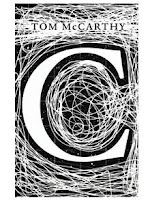 |
| Jonathan Cape, 2010 |
This is one of those post-modern, experimental works that I don't quite know how to appreciate. That the plot is inconsequential I can accept. What I cannot abide are improbable, surreal characters that I am unable to identify with. While I understand that a novel may be an abstract piece of art, my preference is for writing that tries to reach out to rather than alienate readers. That is of course my own opinion - there is an entire genre of works that eschews conventional literary devices such as characterisation.
C is about, if I can sum it up in one word, communication - the ability or inability to communicate whether directly or through some other medium, like sign language, symbolism, technological equipment or even an actual medium (at a seance). The C in communication is probably one of the Cs the title has reference to. Another obvious reference: the four parts of the book are named Caul, Chute, Crash and Call. These are each meant to mirror a segment of the life of the main character, Serge Carrefax (another C); 'Caul' and 'Call' being pronounced the same way is surely a symbolic closing of the loop.
The novel starts when Serge is born and finishes when he dies, but the life and times of Serge Carrefax, while providing momentum for the book to travel, is clearly not the point. McCarthy uses the linear backbone of Serge's life to draw together several interconnected threads into a stylistic web. In the first part of the book, 'Caul', representing the good-luck caul that Serge was born with, McCarthy introduces he elder Mr Carrefax's obsession with communication, seen in the way his lifelong mission is to extricate speech from mute children and to invent communication devices. This is in stark contrast to the rest of his family, who either can't or refuse to communicate. Mrs Carrefax, born mute, disobeys her husband's instructions not to use sign language. She does not scream when giving birth nor when a young Serge almost drowns. Sophie, Serge's older sister, who finds an obsession with communicating in secret code, is unable to articulate a call for help when sexually abused by an older man. Sophie eventually commits suicide, a loss which has a lasting impact on Serge. Serge is a receiver. From a young age he rarely transmits - his inability to do so and therefore his storing up of grief and other emotions is represented in the way he expresses nothing during his sister's funeral. Instead he sits for hours on end in front of a wireless radio trying to interpret signals and codes he receives over the airwaves.
Serge's ability with the wireless radio leads to him becoming a signal operator in a spotter plane during the first World War. The chapters on Serge's drug-addled war years are completely lost on me, save that I can only surmise the impact of his sister's death on his emotional state by his desire to self-destruct, such as:
Of all the pilots and observers, Serge alone remains unhaunted by the prospect of a fiery airborne end. He's not unaware of it: just unbothered. The idea that his flesh could melt and fuse with the machine parts pleases him.
I say the writing 'alienates' because I get the sense that my discomfort while reading the book is a deliberate effect. Each member of the Carrefax family is obscure and difficult to identify with in his or her own way. Serge, in particular, is remote and perhaps not meant to be sympathised with. There are of course odd pockets where he is appears human, for instance when he smugly disrupts a seance that he attends with his girlfriend, Audrey. When he sees Audrey upset, he feels sorry and angry with himself for his cruelty towards her. But there is no apology, instead another hedonistic imbuement of drugs and a car crash.
Part Four, 'Call', sees Serge at his most bereft. He misinterprets or mishears the things people say more than ever. He suffers a fever caused by an infection, and while he in a halllucinatory daze, arrives at the following conclusion:
Like time itself, he's flattening, turning into carbon paper: the black smear between the sheets, the surface through which things repeat, CC themselves, but that will itself always remain black, and blank.
The pathos is immense, yet I feel no sympathy. This disconnect is no doubt intended, and does of course contribute to the overall style and subtext of the novel, but I am left cold.
I can see that C is indeed a work of art - a gothic piece that is stark, tightly constructed and highly intelligent. Pity I don't like it.
No comments:
Post a Comment